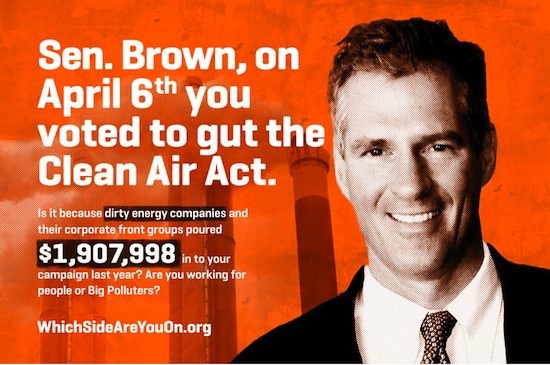Mere weeks after Senator Scott Brown was targeted by rallies and ads across Massachusetts for his controversial vote to gut the Clean Air Act, the Metro Boston Transit Authority has ruled that an ad highlighting his vote is “too controversial” for their riders.
The ad in question was crowd-funded by hundreds of Boston area residents who gave an average of $40 each to spread the word of Brown’s contentious vote and its connection to the $1.9 million poured into his campaign by the fossil fuel industry and their corporate front groups.
Residents, fired up after a massive rally two weeks ago in downtown Boston, teamed up with grassroots climate campaign 350.org and crowd-funded ad start-up Loudsauce to put the ad in Boston T Stops. They were stopped short of their goal by the MBTA ruling that it was “too controversial.” Here's a photo of the rejected ad:

Other recently banned ads include movie ads deemed too “sexy” or “risqué” and a marijuana legalization ad deemed inappropriate for seemingly promoting smoking to kids. A recent uproar was caused by ads with near-naked women promoting hard alcohol, but those ads have yet to be banned.
350.org plans to keep the focus on Sen. Scott Brown's voting record on climate and clean air. We're raising more funds to we can take this advertisement to the streets on bike-powered billboards that will fan out throughout downtown Boston.
Chip in to help us run these bike-powered ads here >>
“As a mother of a child with asthma, I wanted to get the word out to local families that Senator Brown voted to gut the Clean Air Act,” said Vanessa Rule, a Boston area mother and activist who organized the downtown rally and donated for the ad. “His campaign benefited from over $1.9 million from the fossil fuel industry, and now he is putting their profits over our health.”
Rather than waste time arguing with the MBTA, 350.org is planning to take the ads out of the subway and into the streets: in the coming weeks, bicycles will pull the banned billboards past iconic places in Boston, as well as Sen. Brown’s district office. From one form of alternative transportation to another, local residents are determined to make their voices heard.
Local residents plan to increase fundraising in response to the banning in an attempt to place the ad in new locations.
“If Scott Brown’s vote and his campaign contributors are too controversial for MBTA, maybe he should think more carefully about who he is representing,” said Josh Lynch, another local organizer of the clean air fight. “This won’t stop us from getting the word out, we will work harder than ever to raise the money to put the ads somewhere new.”
The Clean Air Act vote specifically was meant to roll back regulations of toxic coal pollution, responsible for more than 251 deaths in Massachusetts every year.